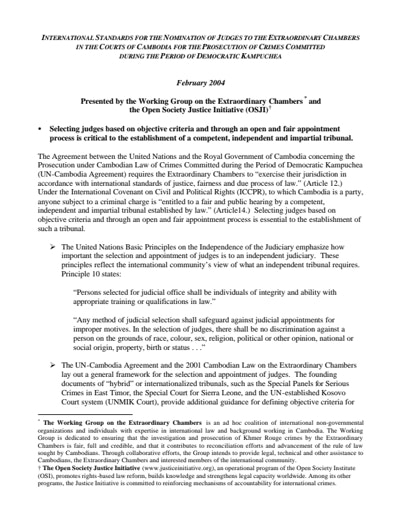Standards for Judicial Nominations to Cambodia's Extraordinary Chambers
International standards for the nomination of judges to the Extraordinary Chambers in the Courts of Cambodia, presented by the Working Group on the Extraordinary Chambers and the Open Society Justice Initiative:
- Selecting judges based on objective criteria and through an open and fair appointment process is critical to the establishment of a competent, independent, and impartial tribunal.
- Candidates must be persons of "high moral character, impartiality and integrity." (Articles 3.3 and 5.2 of UN-Cambodia Agreement)
- Candidates must be committed to being "independent in the performance of their functions and shall not accept or seek instructions from any Government or any other source." (Articles 3.3 and 5.3 of UN-Cambodia Agreement; Article 10 of the Law on the Extraordinary Chambers)
- Judges should not be chosen from among persons who are likely to be repeatedly disqualified from cases.
- Candidates must possess the "qualifications required in their respective countries for appointment to judicial office." (Articles 3.3 and 5.2 of UN-Cambodia Agreement)
- Candidates should have experience in "criminal law [or] international law, including international humanitarian law and human rights law." (Article 3.4 of UN-Cambodia Agreement)
- Candidates should reflect the experience and stature of the most qualified and respected judges in their respective jurisdictions.
- Candidates should be selected through an open and fair appointment process.
Topics
- Climate Justice
- Digital Rights and Fair Elections
- Discrimination and Racial Justice
- International Crimes
